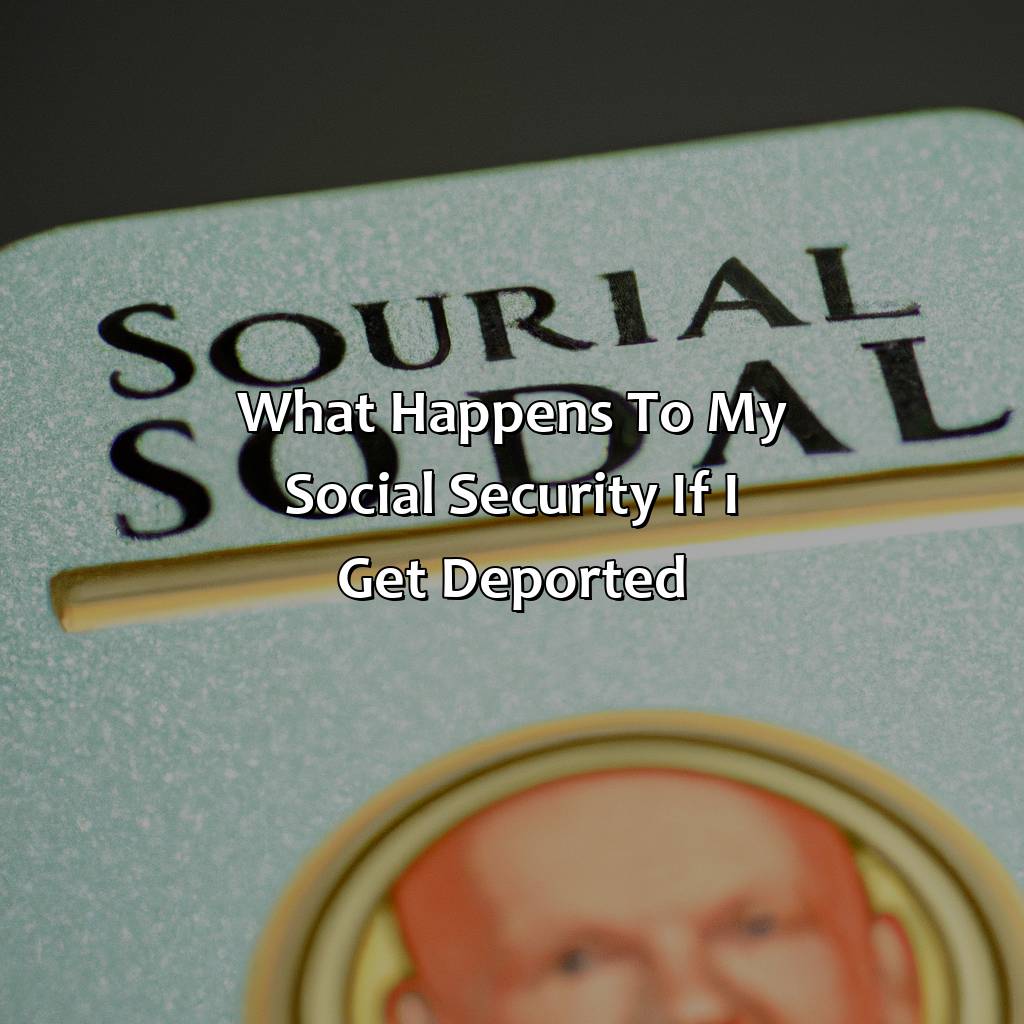What Happens To My Social Security If I Get Deported?
Key Takeaway:
- Social security benefits can be impacted if an individual is deported, and they may lose their benefits entirely. This can have a significant impact on the individual and their family members who rely on those benefits.
- The reasons for losing benefits may include failure to report changes in status, non-compliance with requests for information, or being outside of the United States for an extended period of time. Family members may also lose their benefits if the primary beneficiary is deported.
- Individuals who are facing deportation and may lose their social security benefits have options for protecting those benefits, including appealing for continuation of benefits, transferring benefits to a qualifying family member, and seeking legal assistance to navigate the complex legal landscape.
Are you worried about what will happen to your Social Security benefits if you get deported? You’re not alone. This article will provide an overview of the regulations regarding Social Security benefits and deportation so you can understand your rights.
Social Security and Deportation
Throughout the world, many individuals rely on social security benefits to provide them with financial assistance. However, for those who are facing deportation, there may be uncertainties about what will happen to their social security benefits. If you are facing deportation, it is important to understand how it may affect your social security benefits and what steps you can take to protect them.
If you are receiving social security benefits and are deported, your benefits will generally cease. However, while you may no longer be eligible to receive benefits, any contributions you have made to the program will remain intact. Depending on your circumstances, you may be able to resume receiving benefits once you return to the US. It is recommended that you speak with an immigration lawyer or a social security representative to explore your options.
It is important to note that if you are deported, you may still be able to receive benefits if you are a citizen of certain countries that have agreements with the US regarding social security benefits. These agreements, known as totalization agreements, allow individuals who have worked in both the US and their home country to combine their contributions to the social security program in both countries, making them eligible to receive benefits.
Pro Tip: It is important to always keep your social security information up to date and to notify the social security administration if you change your address or immigration status. This can help to ensure that your benefits are not interrupted or delayed.

Image credits: retiregenz.com by Joel Duncun
Possibility of Losing Social Security Benefits
Losing Social Security Benefits due to Deportation
Deportation from the United States can result in the loss of social security benefits for non-citizens. Eligibility for benefits is based on a valid Social Security number and proof of lawful residency or citizenship. If these requirements are not met, benefits may be terminated.
It is important to note that receiving benefits before deportation does not guarantee their continuation. The Social Security Administration may require proof of continued eligibility, and failure to provide it can lead to benefit termination.
Non-citizens who are deported while receiving disability or retirement benefits may still be able to receive payments, depending on their country of origin, as agreements exist between the US and some other countries regarding these benefits.
If a non-citizen is still in the US and fighting deportation proceedings, they may qualify for benefits if they have valid work authorization or have paid Social Security taxes for a specific number of years.
To avoid the possibility of losing social security benefits due to deportation, it is important to maintain legal residency or citizenship. Seek legal advice and address any immigration issues as soon as possible to mitigate the risk of losing benefits.

Image credits: retiregenz.com by Adam Duncun
Options for Protecting Social Security Benefits
When faced with the possibility of deportation, there are several things you can do to protect your social security benefits. Here are six options to consider:
- Notify the Social Security Administration (SSA) of your current status to ensure proper benefit payments.
- Petition for a waiver of deportation.
- Appeal the deportation order.
- Apply for legal permanent residency or citizenship to maintain eligibility for benefits.
- Transfer benefits to a trusted friend or family member.
- Consider alternative forms of income and financial support.
It’s important to note that while your immigration status may impact your ability to receive benefits, certain exemptions and waivers may still apply. To ensure you receive the benefits you’re entitled to, it’s important to seek guidance from a trusted legal professional.
In addition to these options, it may also be helpful to investigate other forms of financial assistance and support. This could include seeking out community programs or organizations that provide assistance to those in your situation, or exploring alternative income streams such as freelance work or part-time employment.
Ultimately, the key to protecting your social security benefits in the face of deportation is to stay informed and proactive. By understanding your options and taking action to protect your financial security, you can help ensure a brighter future for yourself and your loved ones.

Image credits: retiregenz.com by Adam Duncun
Five Facts About What Happens To My Social Security If I Get Deported:
- ✅ If you are deported while receiving Social Security benefits, your payments will stop. (Source: Social Security Administration)
- ✅ You may be able to receive benefits while outside the U.S. if you are a citizen of certain countries and meet certain requirements. (Source: Social Security Administration)
- ✅ If you return to the U.S. after being deported, you may be able to reclaim your Social Security benefits. (Source: Social Security Administration)
- ✅ If you contributed to Social Security while working in the U.S., you may be eligible for benefits even if you are deported. (Source: U.S. Citizenship and Immigration Services)
- ✅ Social Security benefits are only available to U.S. citizens and certain eligible non-citizens. (Source: Social Security Administration)
FAQs about What Happens To My Social Security If I Get Deported?
What happens to my social security if I get deported?
If you are deported from the United States, your social security benefits will typically be stopped.
Will I be able to access my social security benefits if I am deported?
If you are deported, you will not be able to access your social security benefits. In order to receive benefits, you must be a resident of the United States or a citizen.
Can I apply for social security benefits if I am deported?
If you are deported, you will not be able to apply for social security benefits. Only individuals who are residing in the United States legally can apply for benefits.
Will my social security benefits be taken away if I am deported?
If you are deported, your social security benefits will typically be stopped. You will no longer be eligible for benefits unless you are able to legally return to the United States.
Can I receive my past social security benefits if I am deported?
If you are deported, you will not be able to receive past social security benefits. You must be a resident of the United States or a citizen in order to receive benefits.
What happens to my social security benefits if I am deported and then return to the US legally?
If you are deported and then return to the United States legally, your social security benefits will typically be reinstated. You will need to provide proof of your legal status in order to continue receiving benefits.


